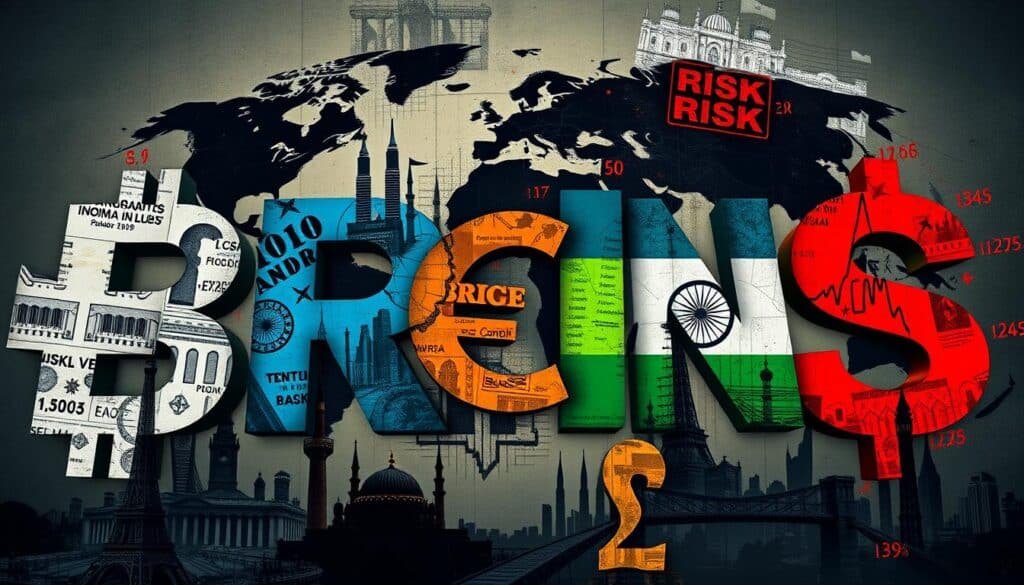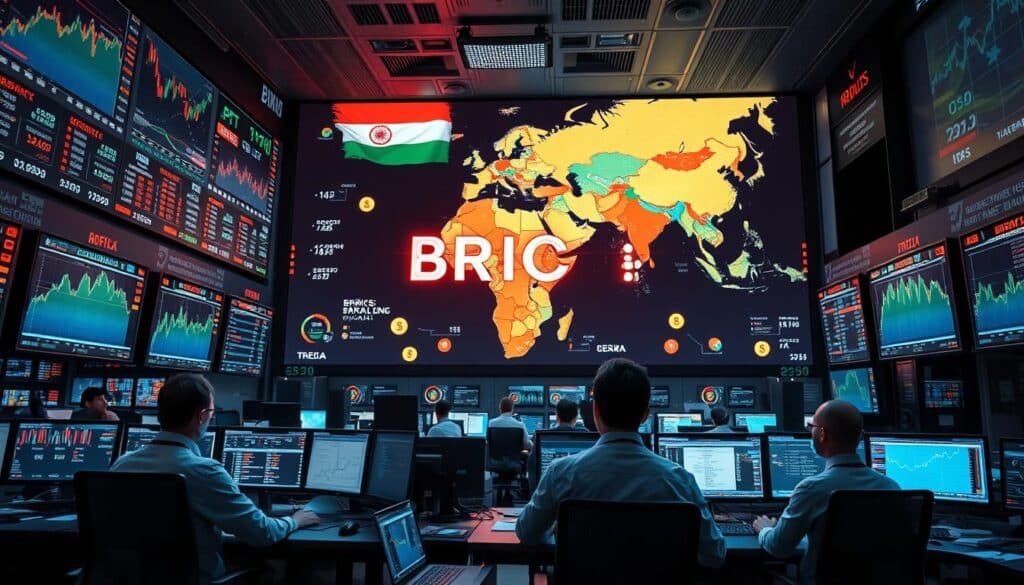
As an investor, I’ve discovered the value of emerging economies, like the BRICS nations. These include Brazil, Russia, India, China, and South Africa. They make up a big part of the global economy and offer great opportunities for investing in BRICS currencies. China’s GDP is expected to hit $18.56 trillion in 2024, making up 19.05% of the world’s GDP1.
The BRICS countries are set to grow fast, with India leading the way at 7.2% growth rate and a GDP of $3.4 trillion. They have opportunities in tech, pharma, and green energy2. Investing in BRICS currencies can diversify your portfolio, tap into growing markets, and offer stability against traditional currencies2.
The BRICS nations are becoming more influential, opening up trade chances and boosting their currency’s global appeal2. In 2010, South Africa joined the BRICS alliance. In 2023, Egypt, Ethiopia, Iran, and the United Arab Emirates were welcomed as new members3. Exploring BRICS currency purchases is exciting, with both opportunities and challenges in emerging market currencies.
Key Takeaways
- Investing in BRICS currencies provides diversification and access to growing markets.
- The BRICS nations represent a significant portion of the global economy and offer unique opportunities for buys brics currency.
- China has a projected GDP of $18.56 trillion in 2024, representing 19.05% of the global GDP1.
- India boasts the highest growth rate of 7.2% and a GDP of $3.4 trillion, with opportunities in technology, pharmaceuticals, and renewable energy2.
- Investing in emerging market currencies, such as those of the BRICS nations, provides potentially stable against traditional currencies2.
- BRICS nations, such as Russia, China, and South Africa, are major gold producers, potentially backing their currency with gold3.
Understanding the BRICS Financial Landscape
The BRICS nations—Brazil, Russia, India, China, and South Africa—make up a strong economic group. They play a big role in the world economy.
What Are BRICS Nations?
Started in 2009, BRICS has grown to include more members. Today, they represent over a quarter of the global economy and nearly half of the world’s population4. Each country has its own economic policies and resources. This diversity drives growth within the bloc.
The Evolution of BRICS Economic Power
BRICS has become a key player in international trade and finance. Their foreign direct investment inflows have quadrupled from 2001 to 20214. This shows strong economic growth and growing global influence.
Current BRICS Currency Dynamics
The BRICS financial market faces a challenge with the U.S. dollar being used in over 80% of global trade45. Yet, efforts to boost BRICS currencies are underway. The New Development Bank (NDB) has approved over $32 billion for projects. This is a step towards strengthening BRICS currencies, even though they are smaller than traditional institutions like the World Bank.
| Statistic | Value | Source |
|---|---|---|
| Global Economy Representation | 25%+ | 4 |
| Population Share | Approximately 44% | 6 |
| Foreign Direct Investment Growth | Quadrupled (2001-2021) | 4 |
| NDB Project Approvals | $32 billion for 96 projects | 4 |
| U.S. Dollar in Global Trade | 80% | 45 |
Why Consider BRICS Currency Investment Today
Investing in BRICS can really boost my portfolio. It gives me a chance to tap into emerging market currencies7.
The BRICS group has grown with Egypt, Ethiopia, Iran, Saudi Arabia, and the UAE joining in 2024. This move has increased its economic power. It now offers access to more markets and resources78. BRICS ETFs now cover a wider range of countries. This means I can reach about 3.5 billion people and nearly 42% of global crude oil output7.
Investing in BRICS could lead to higher returns. It also acts as a shield against the ups and downs of traditional currencies. The growing use of the renminbi and more than 90% of China-Russia transactions in their own currencies make BRICS currencies more stable9.
The move towards non-traditional currencies and the dollar’s decreasing role in reserves shows the rise of emerging market currencies. By following these trends, I can make my investments more relevant to today’s economic shifts.
| ETF Name | Assets Managed (in millions) | Expense Ratio |
|---|---|---|
| iShares MSCI BIC ETF | $67.62 | 0.69% |
| iShares MSCI Brazil ETF | $5,640 | 0.59% |
| iShares MSCI India ETF | $8,040 | 0.65% |
| WisdomTree India Earnings Fund | $2,150 | 0.85% |
| Invesco India ETF | $209.8 | 0.78% |
| Franklin FTSE Brazil ETF | $174.78 | 0.19% |
How to Buy BRICS Currency: Essential Steps
Many investors, like me, are looking into buying BRICS currency. This move helps diversify our portfolios. Here’s how I go about it.
Choosing Your Currency Exchange Platform
Finding a good BRICS currency exchange platform is key. I seek platforms that offer many BRICS currencies and are secure. Reading reviews and user feedback helps me pick the best one10.
Setting Up Your Trading Account
After picking a platform, setting up a trading account is next. I need to provide ID and proof of address. Knowing the platform follows financial rules makes me trust my transactions11.
Understanding Exchange Rates and Fees
It’s vital to know the exchange rates and fees before buying. I compare platforms to find the best rates and lowest fees for buying BRICS currency. This way, I get the most from my investment while keeping costs down12.
Risk Assessment and Portfolio Integration

Adding BRICS currencies to your portfolio needs a good risk check. This ensures your investments match your financial goals. Knowing BRICS market trends is key for smart investment choices.
Currency Volatility Factors
BRICS currencies can swing a lot due to economic policies, trade, and global mood. For example, high inflation in Brazil and Russia cuts the value of your money13. Also, new digital currencies, like Russia’s in 2023, try to keep trade steady despite global pressure13.
Geopolitical Considerations
Global events greatly affect BRICS markets. Issues like China-India border fights and Russia skipping South Africa talks can shake currency stability14.
Optimal Portfolio Allocation
Choosing how much of your portfolio to put in BRICS currencies depends on your risk level and goals. Spreading investments across BRICS countries can help reduce risks tied to one economy. Here’s a possible way to split your investments:
| Asset Type | Percentage Allocation |
|---|---|
| Brazilian Real (BRL) | 20% |
| Russian Ruble (RUB) | 20% |
| Indian Rupee (INR) | 30% |
| Chinese Yuan (CNY) | 30% |
By evaluating risks and planning your investments wisely, you can use BRICS to boost your portfolio’s performance.
BRICS Investment Strategies for US Investors
Investing in BRICS currencies can help reduce risks tied to Western currencies. BRICS countries have over 40% of the world’s population and nearly 24% of global GDP15. This can make your portfolio more stable.
One smart move is to use BRICS investments to protect against US dollar swings. By buying BRICS currency, you can lessen the impact of dollar ups and downs. This is true during economic downturns or when policies change15.
It’s key to know the tax rules for foreign currency investments. Understanding these can help you follow the law and get the most from your investments. Getting the right financial advice can make this easier.
Mixing BRICS investments with your US-based assets could increase your earnings. The growth and influence of BRICS nations over the last 20 years offer many BRICS investment opportunities15.
- Hedge against dollar fluctuations
- Diversify investment portfolio
- Enhance possible returns
- Navigate tax and regulatory landscapes
| Strategy | Benefits |
|---|---|
| Hedging Against Dollar | Reduces exposure to USD volatility |
| Portfolio Diversification | Mitigates risks from economic downturns |
| Maximizing Returns | Capitalizes on BRICS economic growth |
| Regulatory Navigation | Ensures compliance and optimizes taxes |
Monitoring Your BRICS Currency Investments

It’s important to keep a close eye on your investments in the BRICS financial market. Knowing how the BRICS economic growth works helps you make smart choices.
Key Economic Indicators
Looking at GDP growth rates is key to understanding BRICS’ economic trends. For example, over 90% of Russia and China’s trade is in yuan or ruble16. Also, with 53% of China’s trade in yuan16, watching these numbers can tell you about currency strength and stability.
Trading Tools and Resources
Using good trading tools keeps you up-to-date on BRICS market trends. Here are some top resources:
- Real-time economic dashboards
- Currency forecasting software
- Financial news platforms focused on BRICS economies
Performance Tracking Methods
There are many ways to track your BRICS currency investments. Using automated systems helps you keep up with changes easily. Also, checking trade balances and inflation rates gives you a better view of market shifts.
| Indicator | Details |
|---|---|
| China’s Trade in Yuan | 53% of China’s trade is conducted in yuan16. |
| Russia-China Trade | Over 90% of trade is in yuan or ruble16. |
| Local Currency Trade Adoption | 80 countries planned to switch to local currency trade in 202316. |
| Southeast Asian Agreement | Southeast Asian states agreed to move to local currency trade16. |
Advanced BRICS Trading Techniques
As BRICS nations like China and India grow economically, brics investment opportunities are getting more appealing. To make the most of these chances, you need to know advanced trading strategies. This is key for successful brics currency exchange.
- Currency Pair Trading: Trading pairs such as RMB/USD or INR/BRL can capitalize on fluctuating exchange rates.
- Leveraging BRICS-based ETFs: Exchange-traded funds focused on BRICS economies offer diversified exposure.
- Options and Futures Contracts: Utilizing derivatives to hedge against risks or speculate on currency movements.
Looking into new BRICS financial products, like the BRICS Bridge blockchain payment system, can boost your strategy. These new tools aim to make transactions smoother and cut down on traditional currency use. Also, knowing how trade between Russia and China has grown by 25% to over $227 billion17 helps in making better investment choices.
For a deeper look at the challenges of reducing dollar dominance, check out this study on BRICS dedollarization efforts.
By using these advanced methods, investors can better handle the brics currency exchange and grab the growing brics investment opportunities worldwide.
Conclusion: Building a Resilient Portfolio with BRICS Currencies
Adding BRICS currencies to my investment plan has been key. The BRICS nations make up over 32% of the world’s GDP and about 42% of its population1819. They offer big chances for growth.
Investing in BRICS lets me spread out my investments beyond usual markets. It taps into currencies of emerging markets with strong economies. As BRICS grows, it will cover nearly half of the world’s population18.
The BRICS nations are moving away from the US dollar. This aims to make their financial markets more stable and less dependent on one currency19. This move is good for investors looking for stability in uncertain times.
Also, adding gold to my portfolio is smart. Gold is a safe place to put money during tough economic times19. Mixing BRICS currencies with other emerging market assets makes my portfolio strong for the long run.
The future looks bright for BRICS currencies and economies. By taking advantage of these chances, I make my investment plan strong. This protects against market ups and downs and helps keep my finances healthy.
FAQ
What are BRICS currencies and why should I consider investing in them?
How can I buy BRICS currencies and which platforms are recommended?
What are the possible risks when investing in the BRICS financial market?
How do BRICS economic growth trends affect currency values?
What strategies can US investors use when exploring BRICS investment opportunities?
Where can I buy BRICS currency and what fees should I expect?
What are the current BRICS market trends that influence currency exchange rates?
Can buying BRICS stocks complement my BRICS currency investments?
How do geopolitical factors impact BRICS currencies and investment opportunities?
What trading tools and resources are available for monitoring BRICS currency investments?
Source Links
- BRIC ETF: What It Is, Pros and Cons, History – https://www.investopedia.com/terms/b/bric-etf.asp
- How to Invest in BRICS: 10 Top Ways to Invest • Benzinga – https://www.benzinga.com/money/how-to-invest-in-brics
- BRICS Currency Revolution: The Most Significant Financial Shift in 50 Years – https://www.linkedin.com/pulse/brics-currency-revolution-most-significant-financial-brrwc
- What Is the BRICS Group and Why Is It Expanding? – https://www.cfr.org/backgrounder/what-brics-group-and-why-it-expanding
- Is There a Threat to the Dollar From a New BRICS Currency? – https://www.merceradvisors.com/insights/investing/is-there-a-threat-to-the-dollar-from-a-new-brics-currency/
- De-dollarisation: More BRICS in the wall – https://think.ing.com/articles/de-dollarisation-more-brics-in-the-wall/
- Pros and Cons of BRICS ETFs – https://www.investopedia.com/brics-etfs-pros-and-cons-8548466
- The BRICS Currency is on the Horizon | Forexlive – https://www.forexlive.com/Education/the-brics-currency-is-on-the-horizon-20241018/
- Analytics – https://valdaiclub.com/a/highlights/brics-transactions-in-national-currencies/
- How to invest in BRICS, explained – https://www.cantechletter.com/2023/08/how-to-invest-in-brics-explained/
- BRICS Currency: What It Is & What It Means for Investors – https://www.sbcgold.com/blog/brics-currency-what-it-is-what-it-means-for-investors/
- BRICS’ International Payment Systems, a Common BRICS Currency, and De-dollarization – Grupo de Estudos sobre os BRICS (GEBRICS) – https://sites.usp.br/gebrics/brics-international-payment-systems-a-common-brics-currency-and-de-dollarization/
- Digital Money Options for the BRICS – https://www.mdpi.com/2227-7072/11/1/42
- BRICS Analysis | First Command – https://www.firstcommand.com/coaching-center/insights/brics-analysis/
- The BRICS currency conundrum: Weighing the pros and cons of a unified monetary system – https://afripoli.org/the-brics-currency-conundrum-weighing-the-pros-and-cons-of-a-unified-monetary-system
- How can BRICS de-dollarize the financial system? – Geopolitical Economy Report – https://geopoliticaleconomy.com/2024/11/03/brics-dedollarize-financial-system/
- BRICS and de-dollarization, how far can it go? – https://responsiblestatecraft.org/dedollarization-china-russia/
- New Kids on the BRICS: What the Bloc’s Expansion Means for the Global Geopolitical and Economic Landscape – https://www.usfunds.com/resource/new-kids-on-the-brics-what-the-blocs-expansion-means-for-the-global-geopolitical-and-economic-landscape/
- BRICS Impact on the US Dollar, Economy, and the New American Rush to Gold – Exploring the Dynamics of a Complicated Time in History – https://www.gmrgold.com/blog/brics-impact-on-the-us-dollar–economy–and-the-new-american-rush-to-gold.cfm






